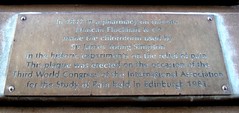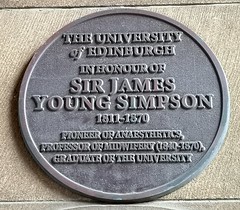James Young Simpson


James Young Simpson
(1811-1870)
discoverer of chloroform anaesthesia (from 1847)
Commemorated on 4 plaques
Thank God for James Young Simpson's discovery of chloroform anaesthesia in 1847.
Parliament Square, Edinburgh, United Kingdom where they was
Sir James Young Simpson Lived in this house from 1845 to 1870, and in 1847 discovered the anaesthetic power of chloroform.
52 Queen Street, Edinburgh, United Kingdom where they lived (1844-1870)
In 1847 in a pharmacy on this site Duncan Flockhart & Co made the chloroform used by Sir James Young Simpson in the historic experiments on the relief of pain. This plaque was erected on the occasion of the Third World Congress of the International Association for the Study of Pain held in Edinburgh 1981.
North Bridge, Edinburgh, United Kingdom where they was
In honour of Sir James Young Simpson 1811-1870 Pioneer of Anaesthetics, Professor of Midwifery (1840-1870), Graduate of the University
, Edinburgh, United Kingdom where they studied




